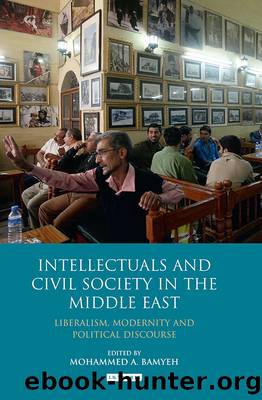Intellectuals and Civil Society in the Middle East by Mohammed A. Bamyeh

Author:Mohammed A. Bamyeh [Bamyeh, Mohammed A.]
Language: eng
Format: epub
Tags: Nonfiction, History, Middle East
ISBN: 9780857732583
Publisher: Bloomsbury Publishing
Published: 2012-07-10T04:00:00+00:00
âAbd al-Ghani al-Nabulusi, the Public Intellectual
In addition to the measured and staid form of his scholarship on the âunity of beingâ, Nabulusi also wrote a host of treatises on topics of much more immediate currency to the people of Damascus, Syria, and beyond. These are the treatises that cover practices such as smoking, tomb visitation, and listening to music. Some of these works are more on the order of polemics aimed at particular individuals and classes of people, who are often not named but are clearly adversaries. They are the kinds of works that one might expect to come out of the heat of a social and cultural battle. In fact, they are the product of a âculture warâ that took place in the Ottoman Empire during the late seventeenth century.
Nabulusiâs most heated polemical works came during a cultural struggle that raged throughout the Ottoman world and pitted an austere, literalist, and reformist interpretation of Islam against prevailing ideas and practices, particularly those associated with popular Sufi orders and the ideas of Ibn Arabi. The Kadizadelis, as the reformists are generally known, were most active in Istanbul but it was not long before the movement had become widespread in Damascus.24 Nabulusi expended great efforts to defend many traditional practices that came under attack by the Kadizadelis. Idah al-dalalat fi-samaâ al-alat and al-âUqud al-luâluâiyah defended music and dance; Kashf al-nur âan ashab al-qubur and Hawd al-mawrud fi ziyarat al-Shaykh Yusuf wa-al-Shaykh Mahmud the practice of tomb visitation; al-Sulh bayn al-ikhwan fi hukm ibahat al-dukhan smoking; and Ghayat al-matlub fi mahabbat al-mahbub homoeroticism. In general, these works expound what we today would consider âliberalâ approaches to religion and life. Nabulusi was a man who was both pious and engaged in the world, with a seemingly equal love of God and life. But, as with the culture wars that rage in our world today, issues as seemingly trivial as smoking or drinking coffee or visiting tombs could enrage and engage. More salient for our purposes here, is that someone like Nabulusi, who could at once be so immersed in seemingly esoteric philosophical disputes could in the next instance write a polemic, publicly deriding his opponents on quotidian affairs like smoking, drinking, and gazing at beautiful boys. This exemplifies a strategy of public intellectual activity, which saw a seamless continuity between philosophical sophistication and ordinary life.
To provide a sense of how heated were those public debates, I would like to quote briefly from one of his most vociferous attacks on an unnamed member of the Kadizadeli camp. In addition to their attacks on Ibn Arabi and popular Sufi practices, the seventeenth-century puritans were much less tolerant of non-Muslims than had been the common practice. One indication of this intolerance was the view that non-Muslim âpeople of the bookâ, namely Christians and Jews, had no chance to making it to paradise in the hereafter. Nabulusiâs rebuttal was titled al-Qawl al-sadid fi jawaz khulf al-waâid wa-al-radd ala al-Rumi al-anid (âThe Correct Teaching Concerning the Possibility that God will not [Punish Christians and Jews]: A Rebuttal of the Stubborn Turkâ).
Download
This site does not store any files on its server. We only index and link to content provided by other sites. Please contact the content providers to delete copyright contents if any and email us, we'll remove relevant links or contents immediately.
| Africa | Americas |
| Arctic & Antarctica | Asia |
| Australia & Oceania | Europe |
| Middle East | Russia |
| United States | World |
| Ancient Civilizations | Military |
| Historical Study & Educational Resources |
Machine Learning at Scale with H2O by Gregory Keys | David Whiting(4295)
Never by Ken Follett(3937)
Fairy Tale by Stephen King(3370)
Oathbringer (The Stormlight Archive, Book 3) by Brandon Sanderson(3157)
The Man Who Died Twice by Richard Osman(3072)
Will by Will Smith(2911)
Rationality by Steven Pinker(2352)
Can't Hurt Me: Master Your Mind and Defy the Odds - Clean Edition by David Goggins(2323)
The Dark Hours by Michael Connelly(2300)
Friends, Lovers, and the Big Terrible Thing by Matthew Perry(2219)
The Dawn of Everything: A New History of Humanity by David Graeber & David Wengrow(2197)
Principles for Dealing With the Changing World Order: Why Nations Succeed and Fail by Ray Dalio(2039)
A Short History of War by Jeremy Black(1842)
HBR's 10 Must Reads 2022 by Harvard Business Review(1839)
Go Tell the Bees That I Am Gone by Diana Gabaldon(1754)
A Game of Thrones (The Illustrated Edition) by George R. R. Martin(1722)
Kingdom of Ash by Maas Sarah J(1668)
515945210 by Unknown(1660)
443319537 by Unknown(1545)
